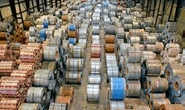Market Data

May 1, 2018
Supply Executives Report Strong Demand in April
Written by Sandy Williams
Supply executives report that new orders, production and employment are growing, according to the latest survey by the Institute for Supply Management.
The April PMI in the ISM Report on Business registered 57.3, a two-point decline from March. Most of the components of the PMI registered a decrease in percentage points from March, but were still well above a reading of 50 that indicates growth. Demand remains strong, said suppliers.
The prices index rose 1.2 points to 79.3, its highest level since April 2011 when it registered 82.6 percent. Prices increased in 17 of 18 industry sectors.
Customer inventories remained at low levels and backlogs continued to expand. “Suppliers were not able to maintain desired inventory expansion levels consistent with production demands for the second straight month. Broad supplier lead-time extensions and freight uncertainties will continue to impact inventory accounts,” says ISM Chair Timothy Fiore. Customer inventories were perceived as too low.
“Inputs, expressed as supplier deliveries, inventories and imports, declined overall, due primarily to inventory reductions likely led by supplier performance restrictions,” said Fiore. “Lead time extensions, steel and aluminum disruptions, supplier labor issues, and transportation difficulties continue.”
“Demand remains robust, but the nation’s employment resources and supply chains continue to struggle,” added Fiore.
Survey respondents had the following comments:
• “Business is off the charts. This is causing many collateral issues: a tightening supply chain market and longer lead times. Subcontractors are trading capacity up, leading to a bidding war for the marginal capacity. Labor remains tight and getting tighter.” (Transportation Equipment)
• “The recent steel tariffs have made it difficult to source material, and we have had to eliminate two products due to availability and cost of raw material.” (Fabricated Metal Products)
• “Demand is up for products. Commodity pricing for steel and other materials increased due to the proposed tariffs. We are seeing commodity futures coming down. A lot of suppliers are asking for increases, and the team is battling those requests.” (Machinery)
• “[The] 232 and 301 tariffs are very concerning. Business planning is at a standstill until they are resolved. Significant amount of manpower [on planning and the like] being expended on these issues.” (Miscellaneous Manufacturing)
• “Business conditions have been good; order book is full and running around 98 percent capacity.” (Primary Metals)
• “Backorders remain strong. New order rate exceeds shipment rate.” (Computer & Electronic Products)







